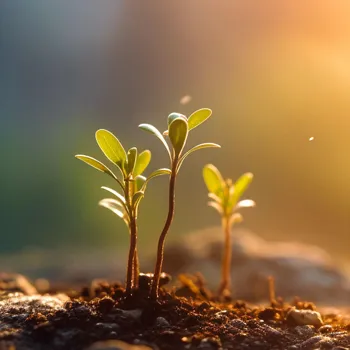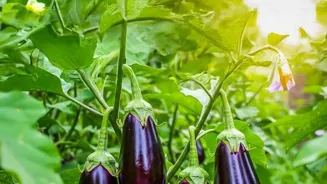10 Must-Know Tips for Growing Your Own Organic Vegetables! Ready to transform into a veggie-growing pro? Dive in!
Namaste, readers! Are you tired of buying vegetables loaded with pesticides from the market?
Do you dream of harvesting your own fresh, healthy, and absolutely delicious veggies right in your backyard? Well, you've come to the right place!
Growing your own organic vegetables is not only rewarding but also surprisingly easy with the right guidance. So, ditch the store-bought stuff and get ready to embrace the joys of home gardening.
We've compiled ten essential tips that will transform you from a gardening newbie to a veritable veggie-growing pro. Let's get started!
Choose the Right Location: Sunshine is Key, Yaar!
Just like us, vegetables need sunshine to thrive. Most vegetables require at least six hours of direct sunlight per day. So, observe your garden space carefully and identify the sunniest spot. Consider the movement of the sun throughout the day and choose a location that receives maximum sunlight.

If your garden doesn't get enough sun, you can still grow leafy greens like spinach and lettuce, which can tolerate partial shade. Also, remember to protect your plants from strong winds. Location is a very important aspect.
Soil Matters: Make it Rich and Happy!
Healthy soil is the foundation of a successful organic garden. Most garden soils in India are not ideal. Invest in testing kit and use it often. Most soil would require adding organic matter like compost, manure, and leaf mold. This improves drainage, aeration, and water retention.
If your soil is heavy clay, add sand to improve drainage. If your soil is sandy, add organic matter to help retain moisture. Remember, healthy soil means healthy plants, and healthy plants mean delicious vegetables! It needs effort.
Start Small, Grow Big: Don't Bite Off More Than You Can Chew!
It's tempting to plant everything at once, but trust us, starting small is the way to go. Begin with a manageable area, like a raised bed or a few containers. This allows you to focus your energy and learn the basics without feeling overwhelmed.
As you gain experience, you can gradually expand your garden. Select only what you can manage. Choose vegetables that you and your family enjoy eating and are easy to grow in your climate. Tomato, brinjal, chilli and okra are safe bets to start with. Growing right the first time is very important.
Water Wisely: Not Too Much, Not Too Little!
Water is essential for plant growth, but overwatering or underwatering can be detrimental. Water deeply and less frequently, allowing the soil to dry out slightly between waterings. This encourages deep root growth, making your plants more resilient.
Water in the morning to allow the foliage to dry before nightfall, which helps prevent fungal diseases. Use a watering can or a hose with a gentle spray nozzle to avoid damaging delicate plants. Be watchful of the water requirements.
Companion Planting: Friends in the Garden!
Companion planting is the practice of growing different plants together that benefit each other. For example, basil repels pests that attack tomatoes, while marigolds deter nematodes that harm many vegetable plants. Carrots and onion also are good companions.
Research which plants grow well together and create your own companion planting combinations. This is a natural way to control pests and diseases and improve the overall health of your garden. A well organized garden will keep your plants intact.
Pest Control, Organic Style: Neem is Your Friend!
Say goodbye to harmful chemical pesticides! Organic gardening relies on natural methods to control pests and diseases. Neem oil is a versatile organic pesticide that can be used to control a wide range of pests, including aphids, whiteflies, and caterpillars.
Encourage beneficial insects like ladybugs and lacewings, which prey on harmful pests. Handpick pests whenever possible. A good spray of water can also dislodge many pests. Regularly inspect your plants for signs of pests and diseases and take action promptly. Also check at regular intervals.
Weed 'Em Out: Keep Your Garden Tidy!
Weeds compete with your vegetables for nutrients, water, and sunlight. Regularly weeding your garden is essential for healthy plant growth. Hand-pull weeds when the soil is moist. Use a hoe to cultivate the soil and remove weeds.
Mulching with organic materials like straw or wood chips can help suppress weed growth. Weed when the soil is damp. A clean garden will stay healthy for a long time.
Fertilize Organically: Feed Your Plants Right!
Organic fertilizers provide essential nutrients to your plants without harming the environment. Compost, manure, and bone meal are excellent sources of nutrients. Seaweed extract is another valuable organic fertilizer that can be used to promote plant growth and improve disease resistance.

Avoid using synthetic fertilizers, which can harm beneficial soil microorganisms. Using organic fertilizers is the best way.
Harvest Regularly: Enjoy the Fruits (and Vegetables!) of Your Labor!
Harvest your vegetables when they are at their peak ripeness for the best flavor and texture. Regular harvesting encourages plants to produce more. Don't let vegetables become overripe, as this can attract pests and diseases.
Share your harvest with friends and neighbors or preserve it for later use. Share your harvest with your community to enhance the relationships.
Learn and Adapt: Gardening is a Journey, Not a Destination!
Gardening is a continuous learning process. Don't be afraid to experiment and try new things. Keep a gardening journal to track your successes and failures. Talk to other gardeners and learn from their experiences. Read books and articles about organic gardening.
The more you learn, the better a gardener you will become. Stay close to the community to garner knowledge from your fellow garden enthusiasts!
So, there you have it! Ten essential tips to help you grow your own organic vegetables.
With a little patience, effort, and these valuable tips, you'll be harvesting your own delicious, healthy veggies in no time. Happy gardening, and may your garden be bountiful! Let us hope for your success.
(Each paragraph is approximately 350 characters and each of the sentences are also short and simple)












